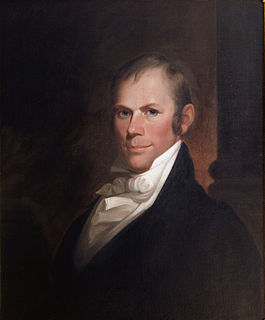
The 15th United States Congress was a meeting of the legislative branch of the United States federal government, consisting of the United States Senate and the United States House of Representatives. It met in the Old Brick Capitol in Washington, D.C. from March 4, 1817, to March 4, 1819, during the first two years of James Monroe's presidency. The apportionment of seats in the House of Representatives was based on the Third Census of the United States in 1810. Both chambers had a Democratic-Republican majority.

Elections to the United States House of Representatives for the 16th Congress were held at various dates in different states between April 1818 and August 1819 during President James Monroe's first term. Also, newly admitted Alabama elected its first representatives in September 1819.
The United States Senate elections of 1818 and 1819 were elections for the United States Senate that had the Democratic-Republican Party gain two seats. The Federalists had only three seats being contested, of which they lost two and the third was left vacant due to a failure to elect.

Pennsylvania elected its members October 13, 1818.

Connecticut elected its members September 21, 1818. The delegation changed from seven Federalists to seven Democratic-Republicans due to the retirement of six incumbents and the party-change of the seventh.

Massachusetts elected its members November 2, 1818. Massachusetts's electoral law required a majority for election, necessitating additional elections in five districts on April 5, 1819 and July 26, 1819.

Vermont elected its members September 1, 1818.

During the 15th Congress, there were two special elections in the 6th district of Pennsylvania, both held in the year 1818. The 6th district at that time was a plural district with two seats, both of which became vacant at different times in 1818. The first vacancy was caused by John Ross (DR) resigning on February 24, 1818 and the second was caused by Samuel D. Ingham (DR) resigning July 6.

On April 20, 1818, Jacob Spangler (DR) resigned from Congress, where he'd represented Pennsylvania's 4th district. A special election was held that year to fill the resulting vacancy.

On January 1, 1818, a special election was held in North Carolina's 7th district to fill a vacancy left by the death of Representative-elect Alexander McMillan (F) before the 15th Congress had assembled.

On November 7, 1818, a special election was held in North Carolina's 11th district to fill a vacancy caused by Daniel M. Forney (DR)'s resignation earlier that year.

On February 21, 1818, Representative Peterson Goodwyn (DR) of Virginia's 19th district died in office. A special election was held to fill the resulting vacancy.

Illinois elected its member August 2, 1819, after the new congress began but before the first session convened. The incumbent had just been elected to the new seat in late 1818.

On April 20, 1818, Thomas B. Robertson (DR) of Louisiana's at-large district resigned. A special election was held to fill the resulting vacancy.

On November 3, 1817, John C. Calhoun (DR) of South Carolina's 6th district resigned upon being appointed Secretary of War. A special election was held for his replacement

South Carolina elected its members October 12–13, 1818.

Illinois elected its new member sometime in 1818, after gaining statehood.

Virginia elected its members in April 1819, after the new congress began but before the first session convened.
The 1818 United States elections occurred in the middle of Democratic-Republican President James Monroe's first term, during the First Party System and the Era of Good Feelings. Members of the 16th United States Congress were chosen in this election. During the 16th Congress, Alabama and Maine joined the union. Democratic-Republicans continued to dominate both chambers of Congress, and slightly increased their majority in both houses of Congress in this election.
This page is based on this
Wikipedia article Text is available under the
CC BY-SA 4.0 license; additional terms may apply.
Images, videos and audio are available under their respective licenses.











